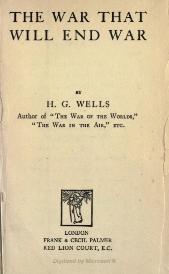The war to end war
During August 1914, immediately after the outbreak of the war, English author and social commentator H. G. Wells published a number of articles in London newspapers that subsequently appeared as a book entitled The War That Will End War.[3] He blamed the Central Powers for starting the war and argued that only the defeat of German militarism could bring about an end.[4] During the First World War, the phrase met with some degree of skepticism.The British staff officer Archibald Wavell, a future field marshal and viceroy of India, said despondently of the Paris Peace Conference, "After the 'war to end war', they seem to have been pretty successful in Paris at making the 'Peace to end Peace'."[6] Wells himself used the phrase in an ironic way in the novel The Bulpington of Blup (1932).
War to End All Wars (album)The War to End All Wars (album)The War That Will End WarH. G. WellsFirst World WaridealisticsardonicallySecond World WarCentral PowersmilitarismcatchphrasesArchibald Wavellfield marshalviceroy of IndiaParis Peace ConferenceThe Bulpington of BlupWalter LippmannRichard NixonEdward M. CoffmanRussell FreedmanAdam HochschildMutual assured destructionPeace for our timeNever againMission Accomplished speechWells, H. G.Internet Archive